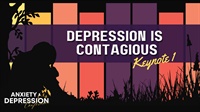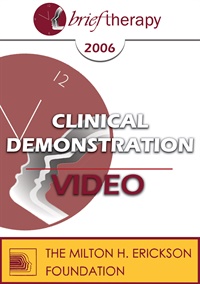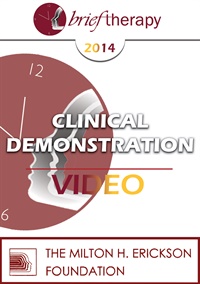- Average Rating:
- Not yet rated
- Topic Areas:
- Keynotes | Cognitive Psychology | Depression | Hypnosis
- Categories:
- Anxiety and Depression Conference 2024
- Faculty:
- Michael Yapko, PhD
- Course Levels:
- Master Degree or Higher in Health-Related Field
- Duration:
- 1:03:13
- Format:
- Audio and Video
- Original Program Date:
- Sep 14, 2024
- Short Description:
- This session reframes depression as a socially transmitted condition rather than simply a biochemical disorder. Yapko reviews research on medication limits, placebo effects, and the impact of factors like social media, COVID, and cognitive style. Participants learn how critical thinking, resilience skills, and experiential methods like hypnosis can help clients move beyond passive treatments toward active recovery.
- Price:
- $59.00 - Base Price
- Average Rating:
- Not yet rated
- Topic Areas:
- Workshops | Depression | Experiential Therapy | Hypnosis
- Categories:
- Anxiety and Depression Conference 2024
- Faculty:
- Michael Yapko, PhD
- Course Levels:
- Master Degree or Higher in Health-Related Field
- Duration:
- 1:55:45
- Format:
- Audio and Video
- Original Program Date:
- Sep 14, 2024
- Short Description:
- This workshop illustrates how hypnosis empowers depressed clients by teaching skills rather than prescribing labels or pills. Yapko shows how trance fosters expectancy, resilience, and self-discovery, offering a powerful antidote to rumination and helplessness. Participants learn how hypnosis provides a flexible, experiential context for change, helping clients reframe their history and embrace new possibilities.
- Price:
- $59.00 - Base Price
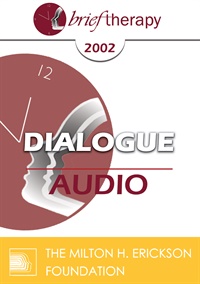
- Average Rating:
- Not yet rated
- Topic Areas:
- Dialogues | Depression | Brief Therapy | Anxiety
- Categories:
- Brief Therapy Conference | Brief Therapy Conference 2002
- Faculty:
- Reid Wilson, PhD | Michael Yapko, PhD
- Duration:
- 55:12
- Format:
- Audio Only
- Original Program Date:
- Dec 13, 2002
- Short Description:
- This dialogue explores the intersection of anxiety and depression, emphasizing the need to assess and treat both conditions together. Key topics include simple screening tools recommended by the Agency for Healthcare Quality and Research, rising depression rates, and the role of psychoeducation and hypnosis in treatment. A case study highlights how addressing depression can lead to meaningful improvements in anxiety symptoms.
- Price:
- $15.00 - Base Price
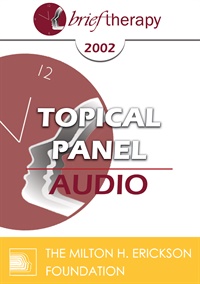
- Average Rating:
- Not yet rated
- Topic Areas:
- Topical Panels | Brief Therapy | Depression
- Categories:
- Brief Therapy Conference | Brief Therapy Conference 2002
- Faculty:
- Judith Beck, PhD | Mary Goulding, MSW | Michael Yapko, PhD
- Duration:
- 58:41
- Format:
- Audio Only
- Original Program Date:
- Dec 13, 2002
- Short Description:
- This panel explores diverse brief therapy models for treating depression, emphasizing tools that clients can use beyond the therapy hour. Panelists discuss cognitive strategies, experiential redecision work, and hypnotic methods that enhance motivation and expectancy. Participants learn practical, skill-based approaches for problem-solving, decision-making, and relapse prevention that foster lasting recovery.
- Price:
- $15.00 - Base Price
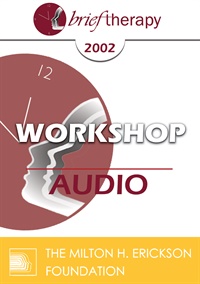
- Average Rating:
- Not yet rated
- Topic Areas:
- Workshops | Cognitive Behavior Therapy (CBT) | Depression | Hypnosis
- Categories:
- Brief Therapy Conference | Brief Therapy Conference 2002
- Faculty:
- Michael Yapko, PhD
- Duration:
- 2:32:28
- Format:
- Audio Only
- Original Program Date:
- Dec 12, 2002
- Short Description:
- In this workshop, Yapko demonstrates how hypnosis can enrich CBT for depression by building expectancy, interrupting rumination, and mobilizing client resources. Through live experiential work, participants see how trance helps clients separate feelings from actions, recognize choices, and envision a future not dictated by the past. The session illustrates hypnosis as a catalyst for resilience, agency, and long-term change.
- Price:
- $15.00 - Base Price

- Average Rating:
- Not yet rated
- Topic Areas:
- Workshops | Anxiety | Depression | Happiness | Love | Relationships | Brief Therapy
- Categories:
- Brief Therapy Conference | Brief Therapy Conference 2002
- Faculty:
- Pat Love, EdD
- Duration:
- 1:40:50
- Format:
- Audio Only
- Original Program Date:
- Dec 15, 2002
- Short Description:
- To love and be loved. Sounds simple - yet for many it is one of life's most difficult challenges. Come and explore three major causes of unhappiness in relationships and gain a deeper understanding of how they are related.
- Price:
- $15.00 - Base Price
- Average Rating:
- Not yet rated
- Topic Areas:
- Clinical Demonstrations | Hypnosis | Anxiety | Depression
- Categories:
- Brief Therapy Conference | Brief Therapy Conference 2006
- Faculty:
- Michael Yapko, PhD
- Course Levels:
- Master Degree or Higher in Health-Related Field
- Duration:
- 1:01:08
- Format:
- Audio and Video
- Original Program Date:
- Dec 08, 2006
- Short Description:
- This session shows how hypnosis creates a multidimensional space for problem-solving by amplifying awareness, uncovering blind spots, and fostering new connections. Yapko demonstrates how trance supports clients in moving beyond self-doubt and rigid definitions toward resilience, forgiveness, and self-trust. Participants learn how hypnosis offers a context for integrating cognition, emotion, and spirit into lasting growth.
- Price:
-
Sale is $29.00
price reduced from Base Price - $59.00
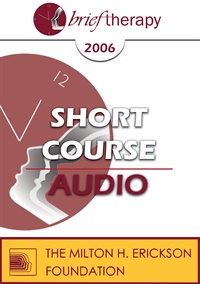
- Average Rating:
- Not yet rated
- Topic Areas:
- Short Courses | Brief Therapy | Depression
- Categories:
- Brief Therapy Conference | Brief Therapy Conference 2006
- Faculty:
- Richard Landis, PhD | Gary Ruelas, DO, PhD
- Duration:
- 1:19:30
- Format:
- Audio Only
- Original Program Date:
- Dec 07, 2006
- Short Description:
- In 1990, the presenters Heinz Von Forester, Gianfranco Cecchin, and Humberto Maturana created the Systemic Constructions human interaction model. This model has evolved into six overlapping domains that affect the social, spiritual and biological influences of human functioning and interactions. This course will teach how to use these six domains to help to ask the right questions that can lead to the break-up of clinical log-jams and increase the lasting effectiveness of the briefer therapies.
- Price:
- $15.00 - Base Price
Tags: Brief Therapy Depression
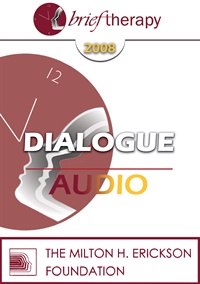
- Average Rating:
- Not yet rated
- Topic Areas:
- Dialogues | Anxiety | Depression | Group Therapy
- Categories:
- Brief Therapy Conference | Brief Therapy Conference 2008
- Faculty:
- Erving Polster, PhD | Michael Yapko, PhD
- Duration:
- 58:43
- Format:
- Audio Only
- Original Program Date:
- Dec 13, 2008
- Short Description:
- This dialogue explores depression as a disorder of perspective, shaped more by coping style and social context than by biology alone. Emphasizing the dangers of rumination, passivity, and isolation, it highlights how therapy can teach clients proactive problem-solving, expectancy, and social skills. The workshop also critiques medication culture, addressing issues from ghostwritten studies and overprescription to ecological concerns. Participants gain practical strategies for building resilience and preventing relapse, while situating depression within a broader cultural and relational framework .
- Price:
- $15.00 - Base Price
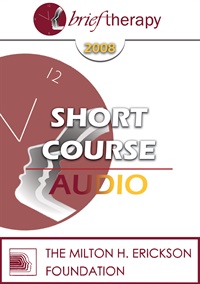
- Average Rating:
- Not yet rated
- Topic Areas:
- Short Courses | Depression | Brief Therapy | Ericksonian Hypnosis and Therapy Techniques | Insomnia
- Categories:
- Brief Therapy Conference | Brief Therapy Conference 2008
- Faculty:
- Deborah Beckman
- Duration:
- 1:24:44
- Format:
- Audio Only
- Original Program Date:
- Dec 11, 2008
- Short Description:
- Many depressed clients know what they “should” do but still cannot sleep. This session looks at sleep as a therapeutic entry point rather than a symptom to manage, using Ericksonian approaches that work indirectly and with less effort. Demonstrations and case material illustrate how humor, imagery, and trance can restore rest and soften depressive inertia.
- Price:
- $15.00 - Base Price
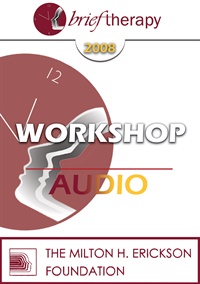
- Average Rating:
- Not yet rated
- Topic Areas:
- Workshops | Depression | Psychotherapy
- Categories:
- Brief Therapy Conference | Brief Therapy Conference 2008
- Faculty:
- Michael Yapko, PhD
- Duration:
- 2:12:27
- Format:
- Audio Only
- Original Program Date:
- Dec 11, 2008
- Short Description:
- As the rate of depression increases around the world, it is apparent that depression is about more than just "bad chemistry." The evidence is clear that social factors play a huge role in depression's onset and course, and these can be better addressed through psychotherapy than with medications. Key aspects of effective treatment will be described in this workshop.
- Price:
- $15.00 - Base Price
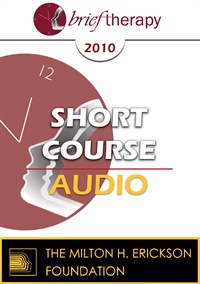
- Average Rating:
- Not yet rated
- Topic Areas:
- Depression | Short Courses | Brief Therapy
- Categories:
- Brief Therapy Conference | Brief Therapy Conference 2010
- Faculty:
- Consuelo Casula, Dipl. Psych
- Duration:
- 1:28:03
- Format:
- Audio Only
- Original Program Date:
- Dec 09, 2010
- Short Description:
- This workshop will present seven ingredients to draw from depressed patients in order to help them to find the harmony they need to start uplifting their lives. The ingredients are Hope, Awareness, Resiliency, Morality, Opportunity, Niceness and Yearning. Combined together, these ingredients are the leavening for a better future.
- Price:
- $15.00 - Base Price
Tags: Brief Therapy Depression
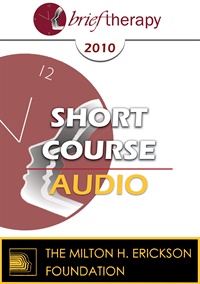
- Average Rating:
- Not yet rated
- Topic Areas:
- Short Courses | Anxiety | Depression | Therapist Development | Trauma | Brief Therapy
- Categories:
- Brief Therapy Conference | Brief Therapy Conference 2010
- Faculty:
- Virgil Hayes, DO
- Duration:
- 1:25:54
- Format:
- Audio Only
- Original Program Date:
- Dec 09, 2010
- Short Description:
- This workshop is a pragmatic look at how to gently, but quickly, understand how anxiety, depression and psychological trauma are created. Understanding the creation leads to co-creation to avenues of intervention. The emphasis is on non-medical, nonpathological understanding of problem creation. Case studies demonstrate the process from problem identification, conceptualizing leading to intervention and problem solving.
- Price:
- $15.00 - Base Price
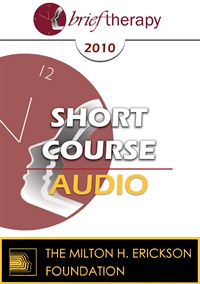
- Average Rating:
- Not yet rated
- Topic Areas:
- Cognitive Behavior Therapy (CBT) | Depression | Short Courses | Mindfulness | Attention Deficit Disorder (ADD)
- Categories:
- Brief Therapy Conference | Brief Therapy Conference 2010
- Faculty:
- Joseph Sestito, MSSA, LISW-S
- Duration:
- 1:29:31
- Format:
- Audio Only
- Original Program Date:
- Dec 09, 2010
- Short Description:
- The basics about mindfulness and cognitive-behavioral therapy will be explained, along with the research findings which show that aerobic exercise helps both ADD and depression through improving brain functioning. Participants will become acquainted with ten mindfulness skills, four CBT methods and five types of aerobic exercise which can help their clients. Participants will see how they can be the instruments who help their clients deliver themselves from distraction to distinction. With Joseph Sestito.
- Price:
- $15.00 - Base Price
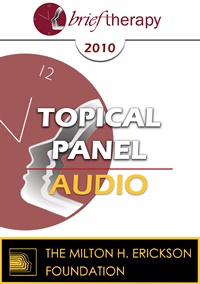
- Average Rating:
- Not yet rated
- Topic Areas:
- Depression | Topical Panels | Brief Therapy | Psychopharmacology
- Categories:
- Brief Therapy Conference | Brief Therapy Conference 2010
- Faculty:
- Jon Carlson | Bill O'Hanlon, MS | Casey Truffo, M.S.,M.F.T. | Michael Yapko, PhD
- Duration:
- 58:30
- Format:
- Audio Only
- Original Program Date:
- Dec 11, 2010
- Short Description:
- This panel explores the challenges and opportunities of brief therapy for depression in today’s cultural climate. Panelists critique medication’s limits, emphasize prevention, and highlight the value of experiential methods such as mindfulness, hypnosis, exercise, and group therapy. Participants gain practical approaches for teaching coping and social skills, reducing relapse, and addressing the broader social dimensions of depression—loneliness, disconnection, and consumer-driven views of mental health.
- Price:
- $15.00 - Base Price
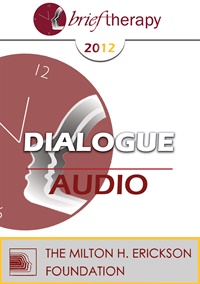
- Average Rating:
- Not yet rated
- Topic Areas:
- Depression | Dialogues | Social Psychology
- Categories:
- Brief Therapy Conference | Brief Therapy Conference 2012
- Faculty:
- Erving Polster, PhD | Michael Yapko, PhD
- Duration:
- 56:07
- Format:
- Audio Only
- Original Program Date:
- Dec 07, 2012
- Short Description:
- This dialogue explores depression through the lens of social context, weaving stories of marriages strained by untreated depression, workplaces eroded by distraction, and communities strengthened by connection. The conversation shows how cognitive rigidity, isolation, and overreliance on medication can worsen outcomes, while group dialogue, experiential learning, and supportive networks open new paths. Participants hear how neuroscience, social psychology, and lived experience all point to the power of relationships in shaping recovery.
- Price:
- $15.00 - Base Price
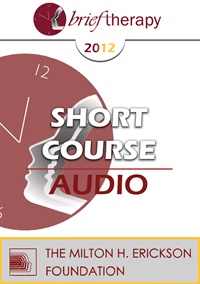
- Average Rating:
- Not yet rated
- Topic Areas:
- Depression | Short Courses
- Categories:
- Brief Therapy Conference | Brief Therapy Conference 2012
- Faculty:
- Jeanne Hernandez
- Duration:
- 1:29:08
- Format:
- Audio Only
- Original Program Date:
- Dec 05, 2012
- Short Description:
- BT12 Short Course 17 – Borrowing From Erickson’s Native American Roots to do Brief Therapy That Changes Lives and Lifestyles – Jeanne Hernandez, PhD This workshop explores the Native American principles such as harmony, hope and respect as they relate to Ericksonian brief therapy, and introduces exercise for grounding and internal stability that ward off stress, depression and daily conflict and that simplify complex decision-making in life, all of which bring clients to therapy.
- Price:
- $15.00 - Base Price
Tags: Multi-Cultural
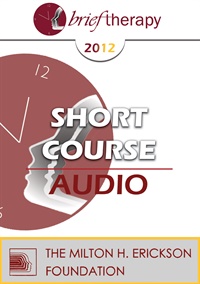
- Average Rating:
- Not yet rated
- Topic Areas:
- Psychotherapy | Anxiety | Depression | Short Courses
- Categories:
- Brief Therapy Conference | Brief Therapy Conference 2012
- Faculty:
- Virgil Hayes, DO
- Duration:
- 1:24:45
- Format:
- Audio Only
- Original Program Date:
- Dec 05, 2012
- Short Description:
- BT12 Short Course 25 – How to Thoroughly Co-Create Brief Therapy Efficiently and Effectively – Virgil Hayes, DO, MSW Psychotherapy is a blend of art and science. However, the art of using a conceptual framework to co-create solutions is overlooked in favor of medical paradigms. This short course focuses on non-medical understandings of anxiety and depression creation to enable the clinician to be more effective in co-creating solutions. Case discussion and lecture for all skill levels.
- Price:
- $15.00 - Base Price
Tags: Psychotherapy Anxiety Depression
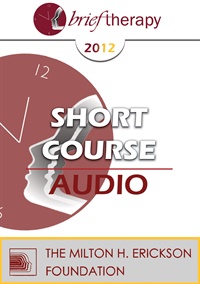
- Average Rating:
- Not yet rated
- Topic Areas:
- Anxiety | Depression | Short Courses | Communication | Neurobiology
- Categories:
- Brief Therapy Conference | Brief Therapy Conference 2012
- Faculty:
- Bart Walsh, MSW
- Duration:
- 1:55:20
- Format:
- Audio Only
- Original Program Date:
- Dec 09, 2012
- Short Description:
- BT12 Short Course 51 – Effective Management of Chronic Anxiety and Depression with Essential Neurobiological Communication – Bart Walsh, MSW Learn how to access deep levels of mind-body functioning for remission of chronic anxiety and depression. Essential neurobiological communication (ENBC) incorporates a form of body language known as ideomotor signaling. Affected individuals learn to fully manage these chronic conditions. Resolve past emotion using a noninvasive protocol integrating a progressive ratification sequence for grounding emotional adjustments in thought, perception and behavior.
- Price:
- $15.00 - Base Price
Tags: Anxiety Depression
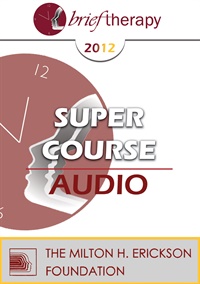
- Average Rating:
- Not yet rated
- Topic Areas:
- Depression | Hypnosis | Super Courses | Experiential Therapy | Mindfulness | Brief Therapy
- Categories:
- Brief Therapy Conference | Brief Therapy Conference 2012
- Faculty:
- Michael Yapko, PhD
- Duration:
- 4:42:27
- Format:
- Audio Only
- Original Program Date:
- Dec 09, 2012
- Short Description:
- The cutting edge of rapidly expanding scientific evidence highlights that the more we learn about the biology of depression, the more important psychology and social experiences become in shaping recovery on all levels. Participants will learn to utilize therapy as a social process that can teach clients skills experientially in order to reduce and even prevent depression. Interventions involving skill building homework assignments, and experiential methods of hypnosis and mindfulness will be considered in depth through group hypnosis and at least one skill-building exercise.
- Price:
- $15.00 - Base Price
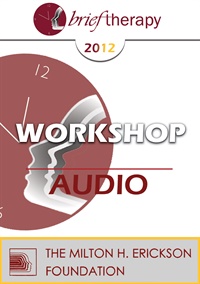
- Average Rating:
- Not yet rated
- Topic Areas:
- Depression | Workshops
- Categories:
- Brief Therapy Conference | Brief Therapy Conference 2012
- Faculty:
- Bill O'Hanlon, MS
- Duration:
- 2:35:18
- Format:
- Audio Only
- Original Program Date:
- Dec 06, 2012
- Short Description:
- BT12 Workshop 13 – The Lincoln Perspective: Lesson About Coping with an Overcoming Depression from an American President – Bill O’Hanlon, MS Abraham Lincoln suffered from what was known as “melancholy” most of his life. In this presentation, you will learn the effective coping and self-treatment strategies he used to deal with and overcome lifelong depression. An inspirational talk with lessons for modern clinicians and clients.
- Price:
- $15.00 - Base Price
Tags: Depression
- Average Rating:
- Not yet rated
- Topic Areas:
- Clinical Demonstrations | Anxiety | Depression | Trauma | Neuroscience | Brief Therapy
- Categories:
- Brief Therapy Conference | Brief Therapy Conference 2014
- Faculty:
- Ernest Rossi, PhD
- Course Levels:
- Master Degree or Higher in Health-Related Field
- Duration:
- 58:34
- Format:
- Audio and Video
- Original Program Date:
- Dec 13, 2014
- Short Description:
- Group and individual demonstrations of psychosocial genomics as the art and science of counseling and psychotherapy that utilizes our natural 4-stage creative cycle for facilitating gene expression and brain plasticity to optimize the resolution of anxiety, depression, trauma and problem solving in everyday life.
- Price:
-
Sale is $29.00
price reduced from Base Price - $59.00
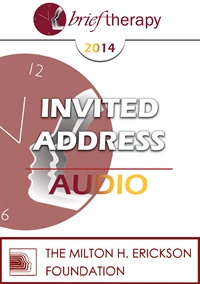
- Average Rating:
- Not yet rated
- Topic Areas:
- Depression | Hypnosis | Invited Addresses | Experiential Therapy | Neuroscience | Brief Therapy
- Categories:
- Brief Therapy Conference | Brief Therapy Conference 2014
- Faculty:
- Michael Yapko, PhD
- Duration:
- 1:08:02
- Format:
- Audio Only
- Original Program Date:
- Dec 14, 2014
- Short Description:
- This invited address brings together research and real-world cases to show how depression is shaped by cognitive style, expectancy, and social context. From a cancer patient using hypnosis for pain relief to clients caught in negative expectancy and unrealistic goals, the presentation illustrates how skills-based, experiential approaches can reduce relapse. Participants see how teaching discrimination strategies, building resilience, and integrating hypnosis into therapy empowers clients to move beyond helplessness.
- Price:
- $15.00 - Base Price
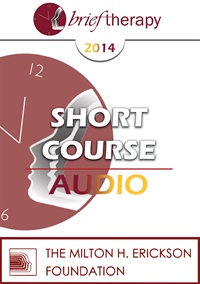
- Average Rating:
- Not yet rated
- Topic Areas:
- Anxiety | Depression | Trauma | Short Courses | Rational Emotive Behavior Therapy (REBT) | Pain and Healing | Brief Therapy
- Categories:
- Brief Therapy Conference | Brief Therapy Conference 2014
- Faculty:
- Debbie Joffe Ellis
- Duration:
- 1:31:16
- Format:
- Audio Only
- Original Program Date:
- Dec 11, 2014
- Short Description:
- Rational Emotive Behavior Therapy (REBT), the holistic approach considered to be the grandparent of cognitive approaches, created by the renowned and brilliant pioneer Albert Ellis PhD, is most effective as a brief therapy for lessening, transforming, healing and preventing emotional disturbances. This Short Course includes a live clinical demonstration, and present the main aspects, methods and techniques of this vigorous, bold and compassionate approach, and is presented by Debbie Joffe Ellis, wife of Albert Ellis.
- Price:
- $15.00 - Base Price
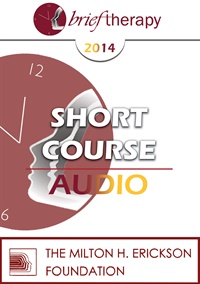
- Average Rating:
- Not yet rated
- Topic Areas:
- Short Courses | Hypnosis | Hypnotherapy | Self-Hypnosis | Ericksonian Hypnosis and Therapy Techniques | Anxiety | Depression | Post-Traumatic Stress Disorder (PTSD)
- Categories:
- Brief Therapy Conference | Brief Therapy Conference 2014
- Faculty:
- Paul Koeck, MD
- Duration:
- 1:37:58
- Format:
- Audio Only
- Original Program Date:
- Dec 11, 2014
- Short Description:
- Hypnotic Scaling is a simple Ericksonian & Solution Focused (self)hypnotic technique, developed by Paul Koeck, MD to help your client self-control and resolve Anxiety and Depression or symptoms of PTSD. You will be able to teach your client to freely choose where (s)he wants to be at a scale from 0 to 10 at any moment or in any context using (Self) Hypnotic Scaling. Your client will be able to choose his emotions, thoughts or feelings when and where (s)he wants!
- Price:
- $15.00 - Base Price


